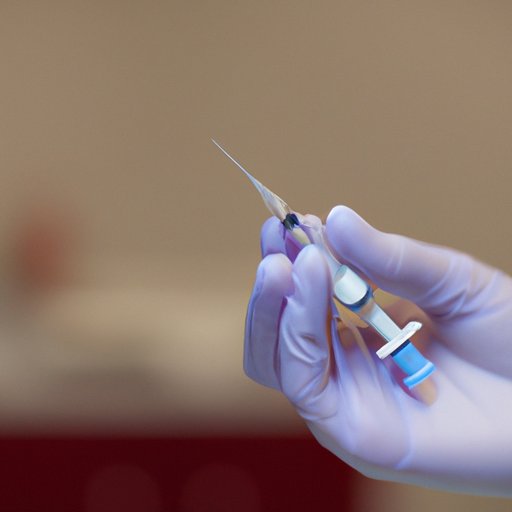
Introduction
IVF treatment involves a series of medical procedures and medications to assist individuals and couples in conceiving a child. Injections are an essential part of the IVF treatment process and can make all the difference in the success rate. This article aims to provide information and insights into the number of injections required during IVF treatment.
The Journey of IVF: How Many Injections Does It Take?
IVF treatment is a process that can involve several steps and stages. During the treatment, multiple injections are necessary to help stimulate egg production and prepare the body for implantation. The number of injections required varies according to factors such as age, hormone levels, and medical history.
Typically, patients can expect to receive around 10 to 12 injections during one cycle of IVF treatment. These injections include hormone injections, trigger injections, and anesthesia. The injections are administered over a period of about two weeks, ending with a final injection before egg retrieval.
Studies have shown that the number of injections does not necessarily correlate with the success rate of IVF treatment. However, it is essential to follow the prescribed medication and injection protocols as recommended by your healthcare provider.
IVF treatment can be both emotionally and physically draining for many patients. It is crucial to communicate with your healthcare provider regarding any concerns or questions you may have. They will be able to provide guidance and support throughout the process.
Understanding the Medication Protocol in IVF
The medication protocol in IVF treatment involves a series of hormonal injections that help stimulate multiple egg production. The medication is used prior to egg retrieval and implantation, and helps to prepare the body for these processes.
During the treatment process, there are varying types and numbers of medications required. Medications such as Gonadotropin-releasing hormone agonists (GnRH agonists) and Gonadotropin-releasing hormone antagonists (GnRH antagonists) are used to suppress ovulation and initiate the stimulation of the ovaries.
Other medications such as Follicle stimulating hormone (FSH) and Luteinizing hormone (LH) are used to stimulate egg production. The number of injections required for each medication varies, and some patients may require additional medications depending on their individual circumstances.
What to Expect When You’re Expecting…Injections
IVF treatment and injections can be overwhelming for many patients. However, there are tips and advice to make the process more comfortable and manageable.
It is essential to prepare yourself both physically and emotionally for the injections. Ensure that you have a support system in place, and communicate with your healthcare provider regarding any concerns or fears you may have. It is also essential to follow the medication protocol recommended by your healthcare provider.
The number of injections required during IVF treatment can vary, but typically, patients can expect to receive 10-12 injections during one cycle of treatment. It is essential to stay organized and keep track of the injections, which will help make the process more manageable.
The Role of Injections in IVF Treatment
Injections play a crucial role in IVF treatment, and are essential for a successful outcome. The injections help to stimulate egg production and prepare the body for implantation. The injections also help to regulate hormone levels, which is important for a successful pregnancy.
The number of injections patients can expect during the IVF treatment cycle varies. However, it is essential to follow the medication and injection protocol recommended by your healthcare provider. Always communicate with your healthcare provider about any questions or concerns you may have during the process.
Maximizing Comfort During IVF Injections
Although injections are a necessary part of the IVF treatment process, there are tips and advice to help maximize comfort and reduce any discomfort.
It is crucial to keep a positive attitude and mindset throughout the process. Ensure that you follow the medication protocol recommended by your healthcare provider and stay organized with the injections. It is also helpful to have a support system in place to help alleviate any emotional or physical stress.
Additionally, some patients may benefit from utilizing numbing cream or ice to reduce discomfort during injections. Speak with your healthcare provider about any available options to help make the process more comfortable.
IVF Injections: A Step-by-Step Guide
IVF injections involve a series of medications that are administered at different stages of the IVF treatment cycle. The injections can be overwhelming for many patients, but with the right preparation and guidance, they can be made more manageable.
It is essential to follow the injection protocol recommended by your healthcare provider. The injections are typically administered subcutaneously, which means that they are injected beneath the skin.
During the different stages of the IVF process, patients can expect to receive varying types and numbers of injections. Patients may receive hormonal injections such as GnRH agonists or antagonists, Follicle stimulating and Luteinizing hormones, or trigger injections to initiate ovulation. It is essential to speak with your healthcare provider regarding any questions or concerns regarding the different types of injections.
Conclusion
IVF treatment and injections can be a challenging and emotional journey for many patients. However, understanding the number and types of injections required during IVF treatment can help alleviate some stress and anxiety. It is essential to communicate with your healthcare provider throughout the process and follow the prescribed medication and injection protocols to help achieve a successful outcome.
This article explored the different types and numbers of injections required during the IVF treatment process. Additionally, we provided tips and insights to help maximize comfort during the injections. Always remember that your healthcare provider is an essential part of your IVF journey, and you can rely on them for guidance, support, and care throughout the process.




